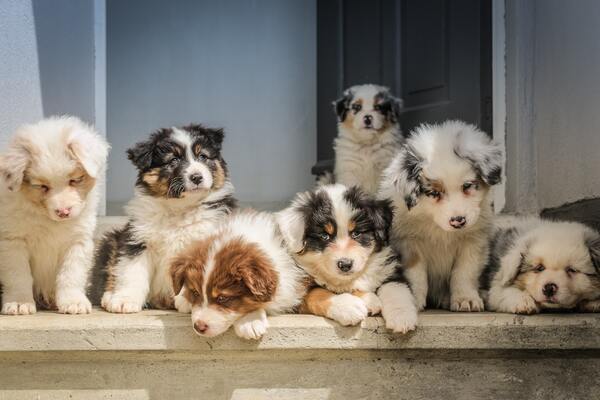You might worry if you see your puppy breathing rapidly while it’s sleeping. However, rapid breathing is typically normal, despite the fact that it may also indicate disease or a lack of fitness. How can you tell if a puppy’s rapid breathing is normal? To learn more about how puppies breathe, continue reading.
Why Is My Puppy Breathing Fast
Numerous factors can make a puppy breathe more quickly than usual. While some are typical and unworthy of concern, others may be seriously harmful. Among the potential causes of a puppy’s rapid breathing are:
- Exercise
- Heat
- Dreaming
- Stress or excitement
- Heart disease
- Lung disease
- Pain
A brief episode of rapid breathing in a healthy puppy that goes away quickly and is not accompanied by any other symptoms is probably not cause for concern.
It’s best to visit your veterinarian for a full examination if the rapid breathing does not stop or is accompanied by other changes in behavior or health.
How Many Breaths-per-minute Is Normal
According to the Animal Emergency Center, the average breathing rate for adult dogs is between 10 and 30 breaths per minute, whereas it may be a little higher in puppies, typically between 15 and 40 breaths per minute.
How can I tell how quickly my puppy is breathing now that you know what that rate is for puppies? Sure, by observing the rapid movement of your puppy’s chest, you can tell when he is breathing quickly, but what are the signs?
Symptoms Of Fast Breathing In Dogs
Despite the fact that dogs typically pant after exercise or strenuous activity, if you see any of the following symptoms, your dog may be having breathing problems or is in respiratory distress:

- Using stomach muscles to help with breathing
- Reluctance to drink, eat or move
- Pale, blue-tinged, or brick red gums
- Drooling
- Open-mouthed breathing
- Heavy, fast breathing that’s a bit louder and sounds different than panting
Causes Of Your Puppy’s Breathing Too Fast
Exertion
Your dog is still cooling off after a rousing play session or workout. Dogs must breathe quickly to cool down and maintain a stable body temperature because they do not sweat.
If you went on a power walk or played fetch with your puppy, they might still be breathing heavily as they take a nap.
Temperature
Dogs once more “sweat” by breathing quickly. Your dog might breathe rapidly while dozing if it’s a hot day or the heat is turned up high. On the other hand, you don’t want your puppy to become overheated.
Just like humans, dogs are at risk of heatstroke. On a warm day, lower the heat or relocate your puppy to a cooler area, preferably inside. Water should be available in plenty for them.
Food Poisoning
The breathing of your puppy may become labored if they ate something they shouldn’t have, such as garlic or onions. If you suspect your dog has eaten poisonous food, you should contact poison control right away or your veterinarian because food poisoning can be fatal.
Trachea Problems
Dogs’ windpipes are called tracheas. Your puppy might start breathing more heavily if it collapses or is under too much pressure. A tracheal collapse can make it more difficult for air to reach your pup’s lungs.
A dry cough is another symptom of this problem. Although puppies can experience problems, older dogs are more likely to experience this problem. Tracheal collapses are more likely to occur in specific breeds, such as Chihuahuas.
Heart Issues
Heart disease may be indicated by heavy breathing. The veterinarian might ask you to check your dog’s resting breathing rate more frequently if ticker trouble is suspected.
What To Do If Your Dog Is Breathing Fast
Count your dog’s respiratory rate while he or she is sleeping or resting to see if it is unusually fast.
Whatever the problem may be, these are all indications that your pet needs to see a doctor right away because it qualifies as a veterinary medical emergency.
Contact your veterinarian if your dog is breathing quickly but otherwise acting normally. Your vet might advise keeping an eye on him for a few days while keeping track of his respiratory rate to see if it settles down.
Diagnosis & Treatment Of Fast Breathing In Dogs
To ascertain whether the issue is with the heart, circulatory system, lungs, airway, neck, head, or another area, the veterinarian will conduct a thorough physical examination. An issue might also be resulting from a general health condition.
Along with your dog, you’ll be questioned about any medical problems your dog has had in the past. To check for conditions like broken ribs or lung tumors, X-rays may be taken of the heart, lungs, and abdomen. It will also look at the organs.
Your veterinarian and you can also keep an eye out for indications of stress, anxiety, or other psychological issues.
The underlying cause will dictate the course of treatment. Your veterinarian might recommend medication, intravenous fluids with calcium, or painkillers.
Special training with a licensed dog behaviorist may be required for stress or anxiety. Rest and oxygen treatment are required regardless of the cause.
While most dogs can be cared for at home, some might require ongoing supervision. For dogs with serious illnesses, hospitalization might be the most secure course of action.
When To Visit Your Vet
It may be necessary to visit your veterinarian for a checkup if your puppy’s rapid breathing persists or is accompanied by other symptoms. Your puppy’s respiratory rate will be measured, and your vet will also listen to his heart and lungs during a thorough head-to-tail physical examination.
In order to assess your puppy’s heart and lungs, your veterinarian might also suggest additional diagnostic procedures like radiographs (x-rays). Your veterinarian will create a treatment plan to help your puppy return to his healthy, happy self once the reason for his rapid breathing has been determined.
Depending on the underlying cause of the breathing issue, treatment options may include drugs, surgery, or a referral to a specialist for additional assistance.
Summary
Especially when it occurs while sleeping, rapid breathing in puppies is frequently normal. Contact your veterinarian right away if your dog is breathing quickly or exhibiting any other worrying symptoms!





